| Article ID | Journal | Published Year | Pages | File Type |
|---|---|---|---|---|
| 399442 | International Journal of Electrical Power & Energy Systems | 2015 | 10 Pages |
•Systematize the analysis of hydrothermal systems under energy supply risk.•Develop a tool to plan and evaluate response during energy supply risk conditions.•Create an energy-supply-risk benchmark.•Integrate the tool into existent medium-term planning systems.•Draw first lessons on how the tool could be used for hydrothermal systems.
HARE, a systematic tool to evaluate demand side measures to face sustained energy supply risk in hydrothermal power systems is presented in this paper. The main focus of the paper is to help centralized planners to systematically discuss, select, and plan the measures that better respond to the variety of critical situations that can arise due to expected energy shortage, integrate them into the usual medium-term scheduling tool and consequently keep the associated overall costs as low as possible. A medium-term definition of the system state is proposed as a decision-making aid, as well as a set of general energy saving measures that can be applied with their corresponding attributes (time delays, costs of implementation, and energy saving impact). The tool is demonstrated and applied to a simplified version of Chilean’s medium-term hydrothermal scheduling model and to a specific risk scenario experienced during 2011. The results show that it is possible to define various sets of demand side measures that avoid the impacts on the system and subsequently to select among them those with least expected implementation costs. This tool seems mainly useful for hydro-electric systems, which are more vulnerable to sustained energy supply risk. Every power system will have to go through a detailed review and planning process to implement this type of tool.
